A Complete Guide On How To Get Rid Of Adderall Tongue
Drinking plenty of fluids and avoiding tobacco are essential to combat this side effect.

Image: Shutterstock
Adderall is one of the many medications used for the treatment of Attention Deficit Hyperactivity Disorder (ADHD). Just like other ADHD medications, Adderall may have side effects that can affect your body. One of the side effects of consuming it could be the Adderall tongue. Hence, recognizing the symptoms of Adderall tongue is important for effective management. This article will explore the concept of Adderall tongue, when to see a doctor, and how to get rid of Adderall tongue.
In This Article
What Is Adderall Tongue?
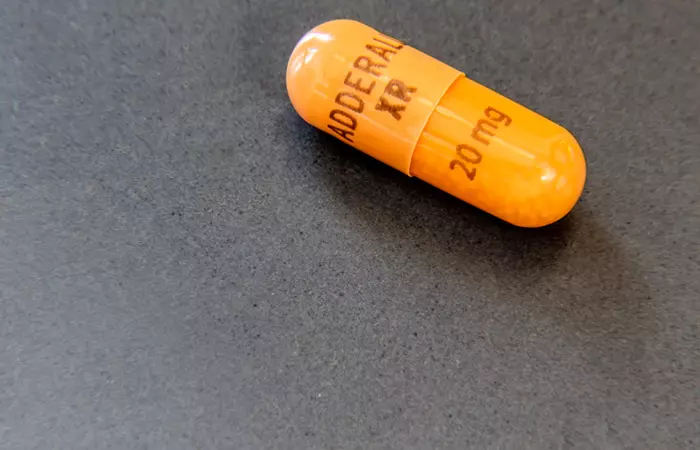
Patients taking Adderall report many Adderall side effects. One of these side effects is known as Adderall tongue, which is a cause of lack of medication management that can lead to involuntary movement, swelling, and teeth clenching.
Adderall is a prescription medication used for the treatment of ADHD. ADHD is a neurocognitive disorderi A disorder characterized by a decline in the ability to think, reason, concentrate, process information, and understand. that is diagnosed in children, adolescents, and adults worldwide (1). This disorder is characterized by the inability to pay attention to tasks for long periods of time and constant fidgeting. Stimulant medications such as Adderall are used to enhance the activity of neurotransmittersi Chemical messengers that carry signals from one nerve cell to another or to other muscle cells and glands. such as dopamine (2). Dopamine is responsible for cognitive activities like attention, memory, motivation, etc. (3).
In the next section, let’s explore the possible signs and symptoms of Adderall tongue.
Key Takeaways
- Adderall is used for treating Attention Deficit Hyperactivity Disorder.
- Amphetamine, a stimulant present in the drug, is associated with the Adderall tongue.
- Sucking and biting the swollen tongue and soreness are the symptoms of the Adderall tongue.
- You should consult a doctor without delay and ensure adequate hydration, chew sugar-free gum, and avoid caffeine.
Signs & Symptoms That Accompany Adderall Tongue
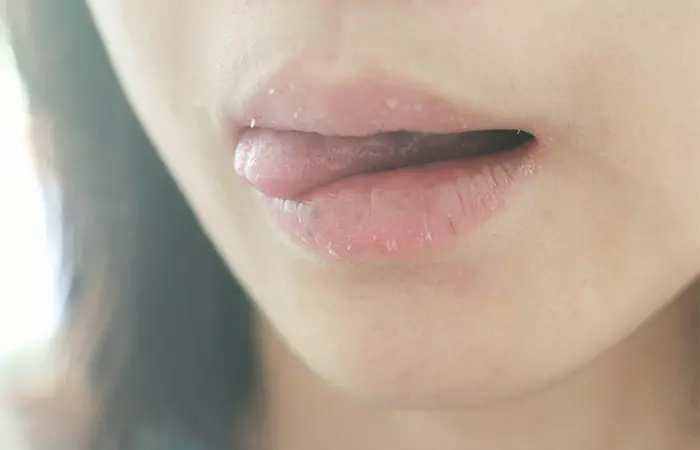
Adderall tongue may be accompanied by the following symptoms:
- Causes the swelling of your tongue and mouth.
- Decreases the saliva in your mouth.
- Results in tongue sucking.
- Results in biting of tongue, inner cheeks, and lips.
- Leads to teeth grinding and clenching (bruxism).
- Results in soreness of the tongue.
Amphetamine, a stimulant present in Adderall, has been associated with the development of dry mouth (4).
While dry mouth and Adderall tongue are some of the common side effects, there are a few lesser-known side effects of consuming Adderall. Let’s take a deeper look at this in the next section.
Other Side Effects Of Adderall

As Adderall is a stimulant, it causes these side effects (5), (6):
- Reduced appetite
- Weight loss
- Slow growth
- Headaches
- Tongue irritation
- Increased blood pressure
- Restlessness
- Insomniai A common sleep disorder in which you have difficulty falling and staying asleep, often as a symptom of other mental health issues.
- Fatigue
- Adderall hair loss
- Depression
- Slow or difficult speech
- Numbness of arm or leg
- Teeth grinding
- Hallucinations
- Abnormally excited mood
- Blurred vision
- Unexplained wounds on fingers or toes
- Peeling skin
- Hives
- Difficulty breathing or swallowing
Aikahi, a blogger, talks about her journey with ADHD and how Adderall helped her with it. While the medication helped her perform better on her term papers, it produced side effects. She writes, “Usually I get very moody and cranky. Also, depression and other negative feelings are very common (i).” She adds that she hates the way she feels when these side effects occur and she likes to stay away from everyone during it.
While everyone may not experience these side effects, it is important to seek immediate medical attention if you do experience them.
When To See A Doctor
If you are taking Adderall for the treatment of ADHD and experience side effects, it is best to consult your doctor. If you have swelling of your tongue that interferes with any breathing, consult your doctor immediately.
Adderall can sometimes cause sudden death in children and teens, especially those with heart problems. Adults with heart issues also have a risk of sudden death, heart attacks, or strokes while taking this medication. So, always discuss the risks with your doctor before starting this medication. Also, call your doctor immediately if you or your child experiences symptoms like chest pain, trouble breathing, or fainting (6).
In the next section, we take a look at the possible ways to get rid of Adderall tongue.
How To Get Rid Of Adderall Tongue

Currently, there is no specific treatment that addresses Adderall tongue directly. However, you can follow the tips below to alleviate the dryness associated with Adderall tongue which may bring you some comfort:
- Drink lots of fluids – Maintaining good oral hygiene, Drinking lots of fluids, and staying hydrated may help relieve the dryness in your mouth that accompanies Adderall tongue. Studies have shown that dry mouth has been associated with dehydration (7).
- Avoid tobacco and caffeine – Drinking water or juice instead of caffeine or tobacco may help combat your dry mouth. Studies have shown an association between tobacco, caffeine, and dry mouth (8), (9).
 Quick Tip
Quick Tip- Chew lozenges, candy, or sugar-free gum – Eating sugar-free gum or lozenges may provide some relief from Adderall tongue and dry mouth. Chewing gums containing xylitoli A natural sugar that does not contain alcohol and is used as a sweetener in cooking, baking, and beverages. may help increase your saliva production, making it one of the best remedies for dry mouth (10). You may also explore some home remedies for dry mouth that can help tame this problem.
- Avoid breathing through your mouth – Breathing through your mouth may make your mouth dry. Instead, breathing through your nose may reduce dryness.
- Limit salty and spicy foods – Salty and spicy foods may irritate a dry mouth further. Instead, opt for milder alternatives and hydrating foods like soups, broths, and fruits with high water content to help maintain moisture in your mouth.
- Suck on ice chips – Sucking on ice chips can help hydrate your mouth and provide temporary relief from mouth dryness that accompanies Adderall tongue.
- Use a humidifier – Using a humidifier helps increase moisture in the air, which may reduce mouth dryness.
This was all you need to know about how to get rid of Adderall tongue. Apart from these options, you may also ask your doctor to adjust the dose or timing of Adderall. If that does not work as well, ask for alternative medications for ADHD.
 Trivia
TriviaIf the symptoms don’t become bearable despite following the above steps, your doctor may detect your medication side effects and stop it altogether. Before you consume or discontinue Adderall, you must take a few precautions.
Safety Precautions

Consulting a doctor before taking Adderall is imperative. A few safety measures you must take are:
- If you are taking other medications, please let your doctor know.
- Do not self-medicate without consulting a doctor.
- Do not reduce or increase the dosage before consulting your doctor.
- Avoid alcohol or any other stimulant as that may worsen the side effects (11).
Since Adderall tongue can cause dry mouth and other dental issues, it is important to have regular dental check-ups. Talking to your dentist about your medication can provide tailored advice for maintaining good oral health.
Infographic: 4 Ways Of Getting Rid Of Adderall Tongue
Does your tongue have a white layer on it or feel dry? No matter how hard you try, you can’t seem to get rid of it? If that’s the case, you might have Adderall tongue. This condition occurs when you take too much Adderall. We have provided simple tips on how to get rid of it. Check out the infographic below to know more! Illustration: StyleCraze Design Team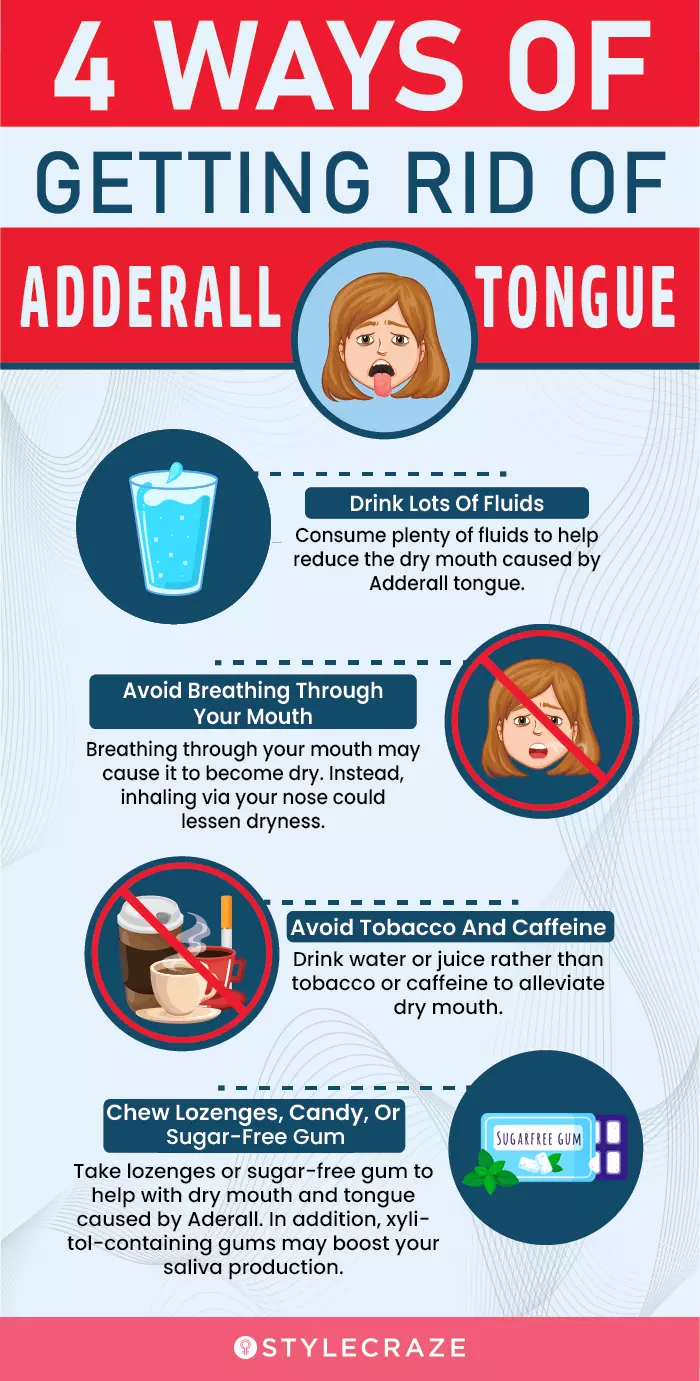
Adderall tongue results from an allergic reaction to the ADHD treatment medication Adderall has both pros and cons While it helps improve focus and attention, it may also lead to dry mouth, weight loss, teeth-grinding, and fatigue among a few other side effects. The above tips and tricks can help if you are wondering how to get rid of Adderall tongue effectively. Staying hydrated and avoiding caffeine, chewing gum, and mouth-breathing can help improve the condition. However, you should consult a doctor in case of a swollen tongue or tongue biting, or any other sort of drug interaction and get age-appropriate medicines.
Frequently Asked Questions
Does Adderall make your breath smell?
Currently, there is no scientific evidence that states that Adderall results in bad breath.
Does Adderall give you cottonmouth?
Yes. Dry mouth or cottonmouth is one of the side effects associated with Adderall.
Can Adderall mess up your teeth?
Consuming Adderall may lead to the development of bruxismi A movement disorder in which a person unconsciously and involuntarily gnashes or grinds their teeth. or teeth grinding.
Does Adderall affect your taste buds?
While there is no scientific evidence yet, Adderall may leave an unpleasant taste in your mouth.
Will the tics from Adderall go away?
Tics may go away when the person stops taking the ADHD medications. However, it is best to consult a doctor to know more about the side effects of Adderall.
Can Adderall make your throat swell?
Yes, Adderall can make your throat swell. You may require immediate medical attention if that happens.
Does Adderall affect gums?
Yes, Adderall may cause dental side effects because of the decreased saliva. The risk of getting gum-related issues is high if you take this medicine.
What to do when you take too much Adderall?
Excess Adderall intake can lead to serious effects. Seek emergency medical assistance.
What is a good amount of Adderall to take?
The standard recommended dosage of Adderall is 5-60 mg daily. However, your doctor may prescribe the dosage based on your requirement (12).
What are the long-term effects of Adderall on oral health?
Long-term use of Adderall can lead to dry mouth, increasing the risk of cavities and gum disease. It may also contribute to tooth decay due to reduced saliva production. Also, you might experience teeth grinding or jaw clenching, which can damage teeth over time.
Learn about the potential side effects of adderall. Watch this video to learn more about it and make an informed decision about your health.
Personal Experience: Source
StyleCraze's articles are interwoven with authentic personal narratives that provide depth and resonance to our content. Below are the sources of the personal accounts referenced in this article.
i. The ADHD Diaries – Adderall worries… and intro of myselfhttps://aikahi.wordpress.com/2007/07/18/the-adhd-diaries-adderall-worries-and-intro-of-myself/
References
Articles on StyleCraze are backed by verified information from peer-reviewed and academic research papers, reputed organizations, research institutions, and medical associations to ensure accuracy and relevance. Read our editorial policy to learn more.
- Characterization of Epidemiological ADHD Studies: A Systematic Review
https://www.researchgate.net/publication/313955090_Characterization_of_Epidemiological_ADHD_Studies_A_Systematic_Review - Evaluating Dopamine Reward Pathway in ADHD
https://jamanetwork.com/journals/jama/fullarticle/184547 - Dopamine in motivational control: rewarding aversive and alerting
https://www.ncbi.nlm.nih.gov/labs/pmc/articles/PMC3032992/ - Effects of amphetamine on salivary secretion
https://onlinelibrary.wiley.com/doi/10.1111/j.1600-0722.2009.00629.x - Amphetamine past and present – a pharmacological and clinical perspective
https://www.ncbi.nlm.nih.gov/pmc/articles/PMC3666194/ - Dextroamphetamine and Amphetamine
https://medlineplus.gov/druginfo/meds/a601234.html - Public knowledge of dehydration and fluid intake practices: variation by participants’ characteristics
https://www.ncbi.nlm.nih.gov/labs/pmc/articles/PMC6282244/ - Relationship between xerostomia and gingival condition in young adults
https://onlinelibrary.wiley.com/doi/abs/10.1111/jre.12183 - Association of Xerostomia and Assessment of Salivary Flow Using Modified Schirmer Test among Smokers and Healthy Individuals: A Preliminary Study
https://www.ncbi.nlm.nih.gov/labs/pmc/articles/PMC3939554/ - Effects of xylitol chewing gum on salivary flow rate pH buffering capacity and presence of Streptococcus mutans in saliva
https://pubmed.ncbi.nlm.nih.gov/20359274/ - SIMULTANEOUS USE OF NON-MEDICAL ADHD PRESCRIPTION STIMULANTS AND ALCOHOL AMONG UNDERGRADUATE STUDENTS
https://www.ncbi.nlm.nih.gov/labs/pmc/articles/PMC3644523/ - Adderall® (amphetamine-dextroamphetamine) toxicity
https://pubmed.ncbi.nlm.nih.gov/23796480/
Read full bio of Jennifer Roelands
Read full bio of Sanchari Bhattacharya
Read full bio of Arshiya Syeda
Read full bio of Dipti Sharma











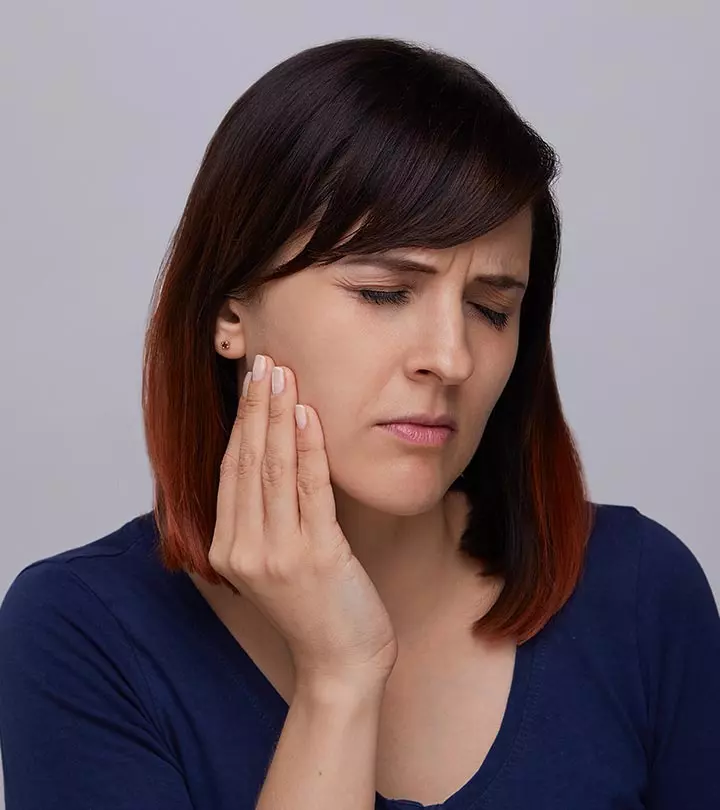
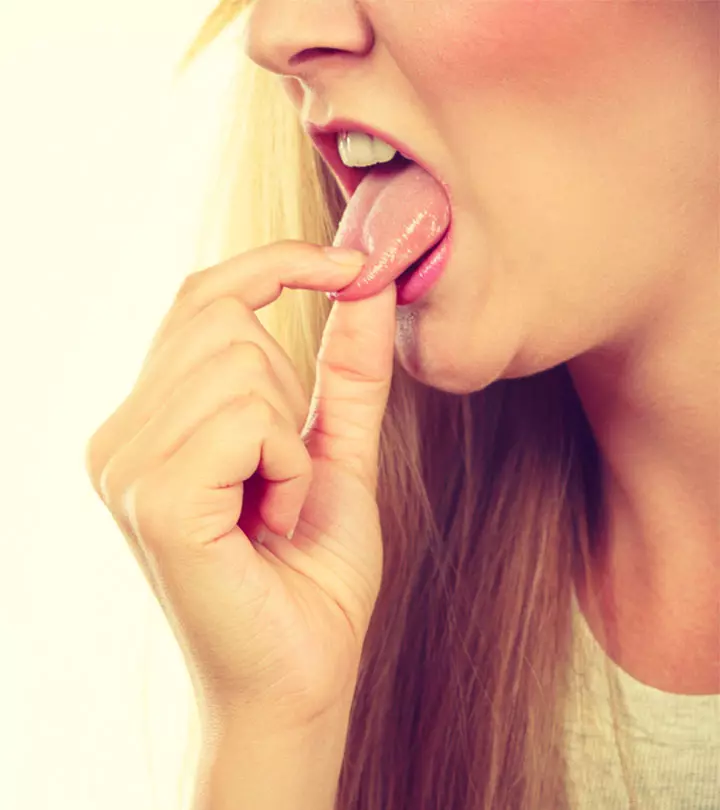
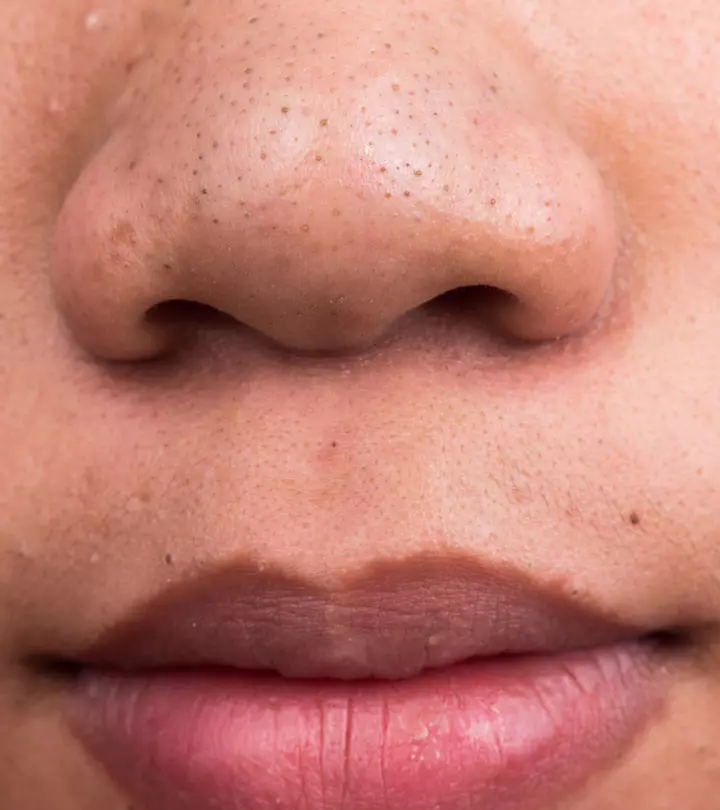












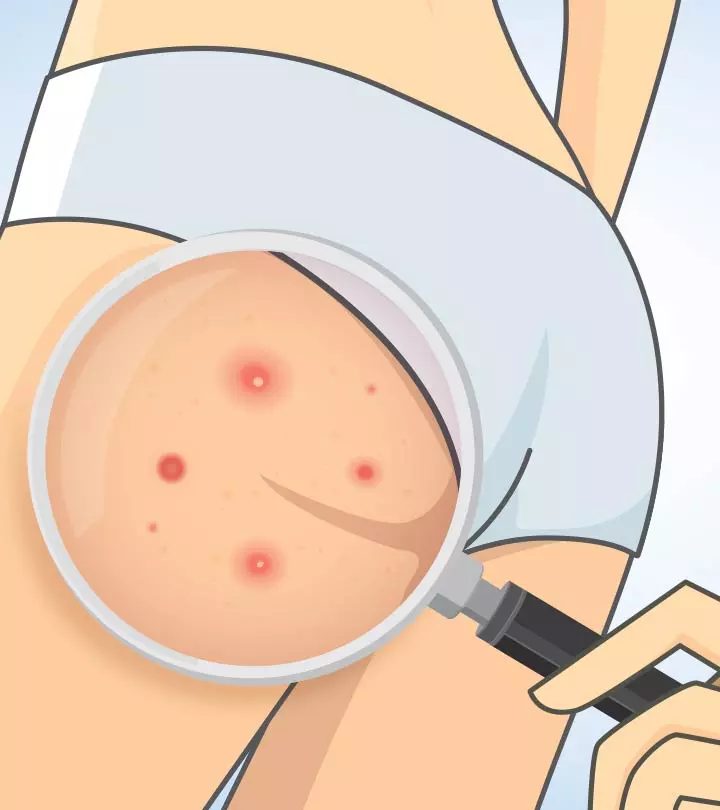
Community Experiences
Join the conversation and become a part of our empowering community! Share your stories, experiences, and insights to connect with other beauty, lifestyle, and health enthusiasts.